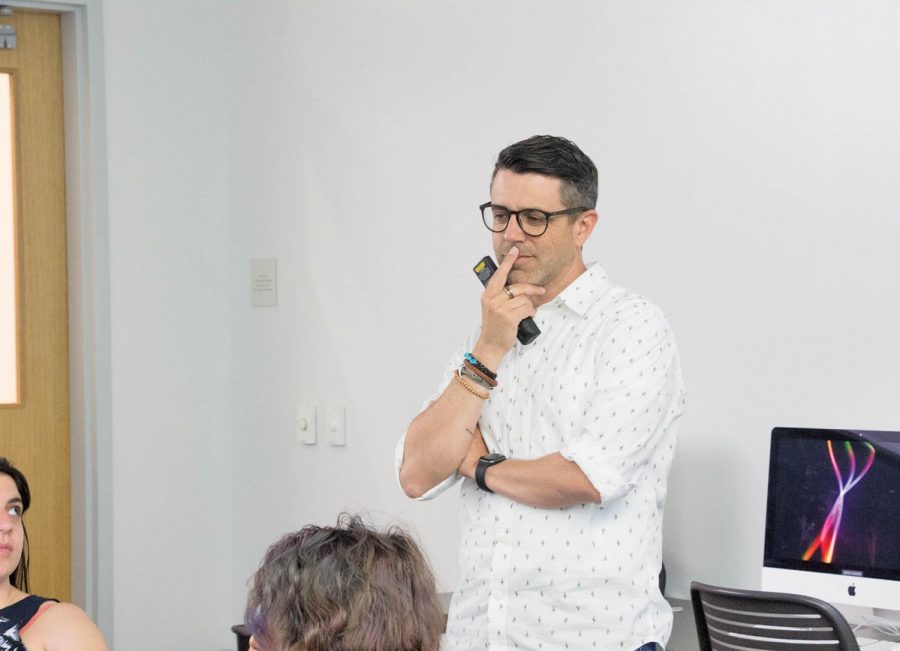Samantha Carrizal / Hilltop Views
Professor Manuel Piña teaches a group of students. Piña believes sharing stories and elements from his personal life with students helps facilitate their education.
Professor educates by opening up
Manuel Piña always walks into class with something to say.
Whether it is a simple question about your day, a story about one of his kids or something completely random, he always makes it a point to start a conversation with his students. Some reply, at times going off on tangents, while others listen or sit quietly. Still, there’s no resisting a laugh — not even a smile — before class actually starts.
These small interactions between professor and student are what make Piña’s Writing and Rhetoric classes more than just another required course. For Piña, sharing stories, photos and asking genuine questions about his students’ lives is not only an important part of teaching, but of being an overall “good” human being.
“Teaching is about people as much as it is about content,” Piña said. “That’s why I care. I care because it’s my ethical, moral responsibility to care about people.”
For most college students, the typical professor-student relationship doesn’t grow much inside, let alone beyond, the classroom. It only ever seems to be strictly professional, such as seeing a professor during office hours or briefly talking to them about something academic. Because of this, it’s almost rare to have a professor that truly, genuinely cares about more than a student’s academic interests.
However, there are ways of breaking these barriers that not only change the dynamic between student-professor relationships, but the way they are viewed.
For Piña, those ways are by simply being open, unforceful and approachable to his students. While he genuinely enjoys sharing about his personal life, he also sees it as an invite for students to open up about theirs. He claims to make himself available “physically, emotionally, and intellectually” to his students, leaving his office door open at all times with coffee waiting to be brewed in the corner.
“For me, it’s a matter of letting a student know I’m here and I can meet you wherever you need me to reach you,” said Piña said. “If we’re going to learn and work together, we need to have some sort of interpersonal relationship.”
While some professors may disagree, Piña finds the connection between a student and professor to be very important when it comes to learning. He believes that without a “foundational relationship,” it is difficult for learning, listening, and growing to take place in the classroom. Which is why he always sets time aside to talk before teaching — so much, in fact, that he incorporates it into his syllubus.
In general, it’s important to have professors who care about students on both a personal and professional level. A simple, “How is your day?” or any other genuine gestures can change the entire perspective and meaning of a professor-student relationship. Yet, for the most part, these close relationships can be so much more. They can be seen as friendships, ones that are long-lasting and reliable throughout a student’s college career. They can offer connections, resources, and mentorship. When a professor cares, they will make it a point to show that they care — in and out of the classroom.
“The class shouldn’t end after those 15 weeks,” said Piña. “When students come up to me just to chat or see me walking across campus … To me, that’s validation of what I’m doing and why I do it.”
